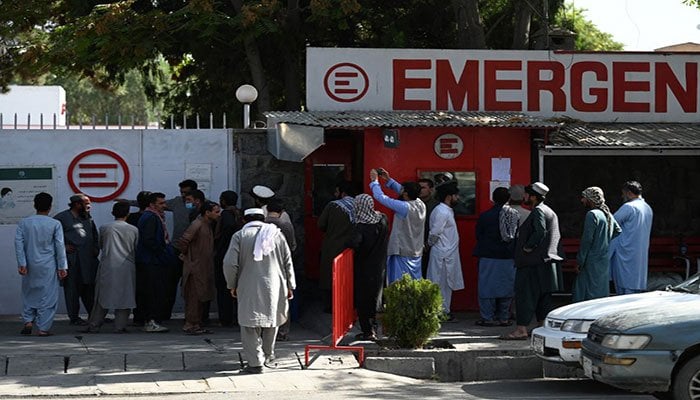Healthcare in Afghanistan is falling apart since Taliban takeover
September 17, 2021

- Afghanistan in desperate need of medicines, say doctors in Kabul.
- War-torn country is short on medicine supply due to closure of borders with Pakistan and other neighbouring countries.
- Dozens of local and foreign medical consultants from Afghanistan have fled to US, Canada, Turkey and other countries following Taliban takeover.
KARACHI: Afghanistan is facing a major health crisis as the country saw a departure of several medical professionals after the Taliban takeover and is short on medicines due to the closure of borders with Pakistan and suspension of trade with India, The News reported Friday, citing doctors in Kabul.
Patients in Afghanistan’s different cities are in desperate need of various types of medicines, which are not available due to the closure of borders with Pakistan and other neighbouring countries, the doctors explained, urging humanitarian organisations to arrange medicines to keep health facilities functional.
“Dozens of local and foreign medical consultants, who were working at various public and private health facilities in Kabul and other provinces of the country have fled to US, Canada, Turkey and other countries following the Taliban takeover," Dr Ahmed Waleed Yousufzai, a consultant haematologist working in Kabul, told The News by phone.
Dr Yousufzai said that medical consultants who are still in the country are "extremely demoralised" as they have not been paid for the last several months.
He received his training in haematology from the National Institute of Blood Diseases (NIBD), Karachi, and is currently working as a consultant haematologist at Kabul’s largest teaching hospital, treating patients with blood cancer and other haematological disorders.
On Wednesday, Pakistani health authorities said Afghanistan's healthcare needs were being assessed.
No money to buy medicine
Kabul and other parts of Afghanistan are also facing an extreme shortage of medicines, especially life-saving drugs as they are not coming to the country from Pakistan and India since the change of government as borders are closed and trade is suspended, the publication quoted Dr Ahmed Waleed as saying.
“Life-saving medicines, especially those for chemotherapy and for the treatment of cancers, are not available. If somebody has any stock, they are being sold at exorbitant prices. People don't have money to buy the medicines, so the patients are in misery,” he said.
Other medications that are not available include: third-generation antibiotics, drugs for the treatment of metabolic disorders, neurological conditions, heart ailments, as well as those for the treatment of diseases of women and children.
Healthcare facilities are unable to treat patients in these conditions, Dr Waleed said.
He said, however, that “some essential medicines are available – thanks to international health organizations including World Health Organization, Red Cross but most of the NGOs have also left the country, so patients of chronic diseases are suffering more with each passing day”.
Dr Waleed explained that many medical consultants had fled from the country, following the Taliban takeover, and have taken refuge in the United States, Canada, several European countries and Turkey.
"Many healthcare workers, including doctors, paramedics, nurses and other staff are unable to perform their duties without remuneration. Unless this issue is resolved, the health crisis in Afghanistan will deepen,” he said. This situation, Dr Waleed said, is turning acute in Kandahar, Jalalababd, Mazar-e-Sharif and Herat.
'Hardly 5-10 COVID-19 cases being reported in Kabul daily'
Speaking about the COVID-19 situation, Dr Waleed said things were "under control" as hardly "five to 10 cases" were being reported in Kabul on a daily basis.
He said public and private hospitals had an ample supply of oxygen. “We have several private labs which are performing COVID-19 tests but their number is quite less as compared to neighbouring Pakistan, Iran or even India,” he said.











